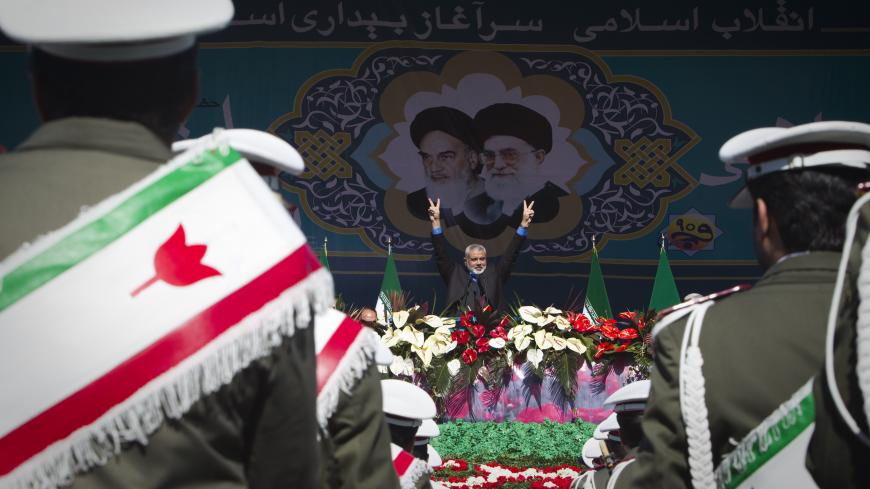Hamas leaders regret speaking out about their renewed relations with Iran, some sources report, and certain foreign advisers to Hamas have recommended that the Islamist movement stop its boasting.
The advisers criticize the multiple public meetings some Hamas leaders have held with Iranian figures and others linked to the Iranian camp. Hamas is now rethinking its behavior, a source close to Hamas’ inner circle told Al-Monitor on condition of anonymity.
According to the source, Hamas leaders will convene a meeting soon to discuss the situation and try to mitigate the repercussions. Hamas believes the publicity has harmed the Palestinian people in general and the Hamas movement in particular, and incited the Iranian people against the Palestinian cause.
This report comes as Iranians continue to protest their country’s increasingly troubled economy and collapsing currency. Iranians are furious at the regime for spending billions of dollars in regional proxy wars at the expense of the country’s struggling economy and the well-being of Iranian citizens. Among the chants heard in the protests were “Leave Syria and think of us,” and “No to Gaza. No to Lebanon.” Some were even heard recently shouting “Death to Palestine,” indicating their discontent with the regime’s aid for Hamas and the Islamic Jihad.
Following years of strained relations — after Hamas refused to toe the Iranian line in Syria and back President Bashar al-Assad against the Islamist-led revolution — Hamas managed in the past two years to restore relations with the Iranian camp. Yahya Sinwar, the Hamas leader in the Gaza Strip, has boasted on multiple occasions about his communications with the commander of Iran’s Quds Force, Qasem Soleimani.
Hamas, by bragging about its rapprochement with Tehran, walked into Israel’s trap. Israel is keen to brand the movement as an Iranian puppet or an extension of Iran, and the boasting made it easier to demonize Hamas’ peaceful endeavor — the Great March of Return — as an Iranian-induced terror plot.
Hamas has been in contact for years now with foreign officials and intellectuals who advised it to change its charter and modify its behavior, try new approaches and embrace nonviolent resistance. Hamas complied and initiated the nonviolent Great March of Return, which became a massive tragedy given that Israeli forces killed more than 155 Palestinian protesters and wounded 15,500.
Since Hamas’ internal elections in February 2017, which came after four years of severe isolation of the Gaza Strip, Hamas has espoused a strategy of opening up to everyone, irrespective of ideology. So the movement mended its relations with Iran and Egyptian President Abdel Fattah al-Sisi, despite vicious criticism from its Islamist counterparts. And Hamas is now trying to mend relations with the Syrian regime and the Palestinian Authority (PA).
Hamas is eager to comfort its own members and to show its enemy Israel and its rival the PA that it isn't isolated. It seeks to rebrand itself to the Arab world and the West. Hamas changed its charter in May 2017 to include acceptance of the two-state solution based on the pre-1967 borders; it has also emphasized that Hamas’ enemy is not Judaism but Zionism, distanced itself from the pan-national Muslim Brotherhood, insisted that Hamas is not seeking to interfere in other Arab countries’ affairs and stressed the movement's ties to Palestinians at the expense of Islamism.
But Hamas' recent bragging about its Iran relations is sufficient to counter all of the reforms.
A Hamas member who’s disconcerted by those relations told Al-Monitor on condition of anonymity, “Hamas shouldn’t reconsider the publicity of its ties with Tehran; it should reconsider the ties altogether. Iranian leaders use the Palestinian cause to score political points inside Iran and outside. They’re justifying their aggressions all over the region in the name of Palestine. [Hezbollah leader] Hassan Nasrallah said, ‘The road to [liberating] Jerusalem passes through Syria.’ Plus, Hamas doesn’t receive any significant support from the Iranian camp, it’s mostly just empty rhetoric, and sometimes [just] minuscule and sporadic financial aid at a bare minimum to keep the relations with Hamas going.”
In 2016, a leaked private call surfaced of Mousa Abu Marzouk, former deputy chief of Hamas’ political bureau. He is heard saying that Iran hasn’t provided any logistical or economic assistance to Hamas since 2009 and that “all [its] claims about assistance are lies.”
Supreme Leader Ayatollah Ali Khamenei of Iran and others who are counted among the Iranian camp repeat the same narrative about how Iran’s regional military involvement is meant to counter the “US- and Zionist-made tools," meaning the Islamic State and unbelievers, who are supposedly being used specifically to distract Muslims from the core issue: the Palestinian cause and the struggle against Israel.
Despite this, and regardless of how much or how little aid Iran provides, Hamas is highly likely to hang on to its relations with Tehran, as the movement can't afford to lose a single ally, and is in desperate need of all the help it can get.







